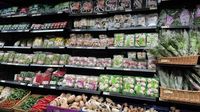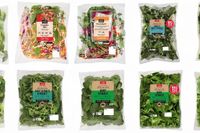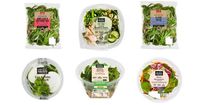Supermarket giant Coles has issued a recall of a wide range of pre-packaged spinach and salad products across Australia due to potential contamination with shiga-toxin-producing E. coli (STEC). This urgent recall affects items sold between March 20 and March 29, 2025, with use-by dates extending up to April 9, 2025. The affected products were available at Coles supermarkets, Coles Online, IGA, and independent retailers across several states, including Tasmania, Victoria, New South Wales, Queensland, and the Australian Capital Territory (ACT), as well as some products sold in South Australia and the Northern Territory.
Dr. Shannon Melody, a public health specialist medical advisor, confirmed on March 30, 2025, that the contamination was detected during routine checks. “STEC was detected in two pre-packaged, ready-to-eat spinach products purchased from separate Queensland supermarkets during proactive public health surveillance,” Dr. Melody stated. As a precaution, Coles and Metcash Trading Limited Australasia, which owns IGA, extended the recalls while further investigations are conducted into the source of the contamination.
More than 15 Coles-branded products are included in the recall, covering various spinach packs, salad mixes, and prepared meals containing spinach. Additionally, seven Community Co products sold through IGA and independent grocers are affected. Consumers are advised not to eat any of the recalled products and are encouraged to either dispose of them or return them to the place of purchase for a full refund.
Coles has warned customers that food products contaminated with STEC may cause illness if consumed. Symptoms can include gastroenteritis, which may result in serious illness in about 10% of cases, particularly for very young children, the elderly, or those with compromised immune systems. “No illnesses have been linked to the recalled products, however these recalls are a proactive measure to protect consumers,” Dr. Melody added.
The full list of recalled products includes:
- Coles Spinach 60g, 120g, 280g, 400g
- Coles Family Mix Stir Fry 400g
- Coles Spinach and Kale 300g
- Coles Spinach and Rocket 60g, 120g
- Coles Beetslaw 320g
- Coles 4 Leaf Blend 200g
- Coles 4 Leaf Mix 120g
- Coles Kitchen Pesto Risoni 190g
- Coles Kitchen Egg and Spinach 100g
- Coles Baby Leaf & Beet Blend 150g
- Coles Baby Leaf Blend 300g
- Coles Mixed Leaf Garden Salad 180g
- Coles Mediterranean Style Bowl 185g
- Coles Beetslaw Bowl 180g
- Coles Sweet Potato Superfood Bowl 180g
- Coles Roasted Pumpkin, Feta and Walnut Salad 265g
- Coles Kitchen Green Goddess Salad 300g
- Community Co Aussie Salad Mix 110g
- Community Co Fine Cut Stir Fry 335g
- Community Co Baby Leaf Salad Mix 260g
- Community Co Leaf Mix 160g
- Community Co Baby Spinach 100g
- Community Co Baby Spinach 260g
- Community Co Baby Spinach and Rocket 100g
- Community Co Garden Salad Bowl 180g
In a statement, Coles emphasized the importance of consumer safety and said, “Customers should not eat these products. Any customers concerned about their health should seek medical advice.” The supermarket chain has also apologized to its customers for any inconvenience caused by the recall.
The recall follows a series of similar actions taken by other retailers, including Woolworths and Aldi, over concerns regarding microbial contamination in various food products. As public health officials continue to investigate the source of the contamination, consumers are urged to remain vigilant and to check their fridges for any affected items.
Food safety authorities also advise that consumers should dispose of any recalled products immediately and keep abreast of updated recalls as the situation develops. With the potential for serious health risks associated with STEC contamination, it is crucial for consumers to take these warnings seriously.
As the investigation unfolds, the focus remains on ensuring food safety and preventing any further incidents of contamination in the food supply. The Australian food safety system relies on the cooperation of retailers, consumers, and health authorities to effectively manage such risks and protect public health.
In summary, the recent recall of spinach and salad products highlights the ongoing challenges faced by food retailers in maintaining safety and quality standards. Consumers are urged to stay informed and cautious, particularly when it comes to pre-packaged food items that may pose a risk to their health.










